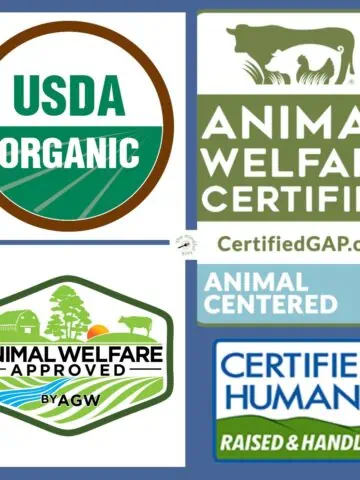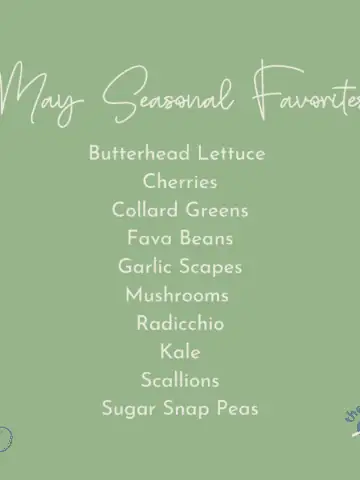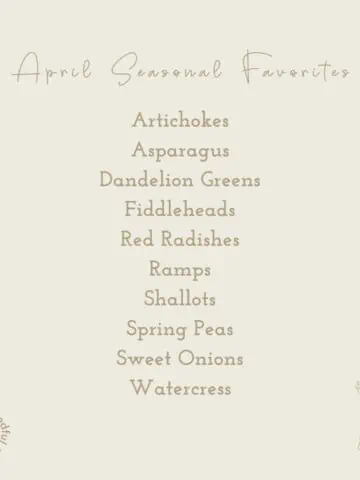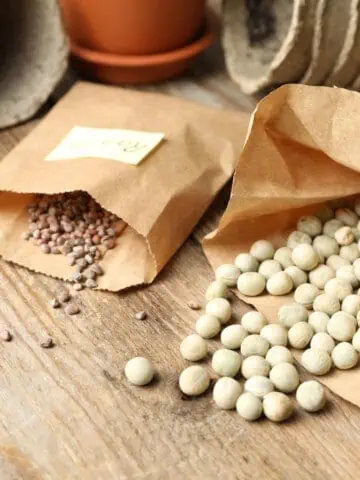
We are all guilty of producing unnecessary waste, especially from our kitchen. Check out how quickly your kitchen garbage and recycle bin fill up. Much of it is from food packaging, which you have little control over, or maybe you do. Being mindful in your kitchen, especially with what you purchase, will reduce kitchen throwaways tremendously. You can make the choice to support brands that are made with compostable packaging. Or, you can cook using less processed packaged food at home, which will naturally reduce the garbage you produce, bringing you one step closer to a zero-waste kitchen.
According to an EPA study from 2018, the average American consumer produces just under five pounds of trash each day, while a family creates about 18 pounds. Multiplying those numbers by 365 days for the year, it all adds up to:
- 1,642 pounds per person.
- 6,570 pounds per family.
Food waste is another area of wastefulness in our kitchen. While the world wastes about 1.4 billion tons of food every year, the United States discards more food than any other country in the world: nearly 40 million tons — 80 billion pounds — every year, according to the Environmental Protection Agency. That’s estimated 30-40 percent of the US food supply. Download a guide to Food Waste in America 2021 here.
Americans waste more than $218 billion each year on food, with dairy products being the food item we toss out the most. The average American family of four throws out $1,600 a year in produce.
Feeding America
All of us play a part in that waste, but we can reduce much of that waste with a few simple changes in habits and products we've gotten accustomed to. Like most things, the more knowledge we have, the better and more efficient we will accomplish the task. The suggestions below are a great starting point. But, learning how to cook will help reduce food waste tremendously!
Eco-friendly Suggestions to Reduce Kitchen Throwaways
Many of us get used to tossing more trash than is necessary because we just don't know what the eco-friendly alternative is. Here are the most popular questions people ask when trying to be more eco-conscious in their kitchen:
A great alternative to using disposable scrubbers is a non-abrasive Redecker copper cleaner or copper cloth. Great for cleaning pots, pans, sinks, ovens, ceramic stovetops, glass, stainless steel, and more without scratching. They are made with 75% Copper Threads and 25% Polypropylene Yarn. Many scrap metal recyclers accept items that are at least 50% metal to be recycled - check with your local scrap metal recycler!

Sponges are one of those kitchen items many of us have gotten accustomed to using. We think nothing of tossing it in the garbage once it becomes worn. Did you know that most sponges are made of polyester and nylon, AKA nonrenewable materials derived from petroleum and gas that will never biodegrade!?
Do your dishes with a compostable Package Free Dish Brush made of wood + sisal fibers. Or, if you prefer using a cloth, Three Bluebirds Dish Cloths are 100% natural, biodegradable, and screen printed with water-based inks.
You can toss one less item in the trash with alternatives like a dish scrubber or a dishcloth!


You're not alone - over 75 million homes brew with single-use pods like K-cups every day, multiple times a day. This means that tens of billions of nonreusable, nonrecyclable plastic pods have ended up in landfills and will take thousands of years to decompose in a landfill contributing to our growing problem of plastic pollution.
There are 3 options: 1- You can use a refillable K-Cup 2- Use a Zero-Waste Box to dispose of your single-use cups, so they don't end up in a landfill 3- Use a single-cup French Press Coffee Maker by Bodum.

Tree Hugger states that washing a napkin in the washing machine can produce five grams of greenhouse gas emissions due to the electricity that’s used and a quarter-liter of water. It takes 24.5 gallons of water to produce paper napkins and will release 7.5 pounds of greenhouse gases in the process.
Decide for yourselves and read - Are Cloth Napkins The Eco-Friendlier Option? It Depends!
While cloth is generally better for the environment because it reduces waste, the fabrics you buy for your cloth napkins and how you reuse them are important factors to consider for the eco-friendliest choice. Linen napkins are a great sustainable alternative to single-use paper napkins. The best choice is linen napkins made from the flax plant - a renewable resource that does not use a lot of water to produce.
And if you really need to use a paper napkin, choose wisely.
Eight Owls Cloth napkins or bamboo napkins are both great alternatives!

If you want to Think Sustainably when using parchment paper, keep in mind that White parchment paper means it is Bleached, and Brown parchment paper is Unbleached Chlorine-free parchment and is fully biodegradable. Instead of disposing of each sheet after every use, reuse it. Another alternative is to use Silicone Baking Mats, which are considered to be safe. Here are a few non-toxic bakeware ideas to keep in mind. ![]()

Blueland cleaning products were produced, so bottles are refilled, not landfilled. Their products have helped over 1 billion plastic bottles from landfills and oceans since 2019. Fill your Forever bottle with water, drop in your cleaning or soap tablet, and start cleaning in minutes.
Or buy your own refillable spray bottle to create your own non-toxic cleaning products!

There are many types of innovative food coverings on the market now. Bees Wraps are made from organic cotton, sustainably harvested beeswax, organic jojoba oil, and tree resin. Bee's Wrap fabric and made from 100% recycled paper and biodegradable cellulose. Stasher makes a great line of 100% pure non-toxic platinum Silicone Food Storage Bags that come in a variety of colors and are made to last a long time. Stasher even has a repurpose program so retired bags do not end up in a landfill!
You can also check out TMF's tips on choosing eco-food storage containers.

Just water containers are made with plant-based plastic and were created as a product to have the least amount of environmental impact. Check out their Life Cycle Analysis study. You can also add a reusable charcoal stick to a glass or jug of water. Each stick lasts up to 6 months and will remove chlorine and add minerals for healthier and cleaner-tasting tap water. Always choose glass over plastic water bottles!

In the U.S., we use an estimated 500 million per day, and in the most recent study in 2017, they were among the top 10 most common items in ocean trash. Did you know that most recycling facilities can’t recycle plastic straws? We are making some headway in minimizing the usage of straws, but these little items still cause big problems to our ocean life. If you feel you need to use a straw, make use of items like these instead - Klean Kanteen Tumbler & Straw or U.S.A. premium handcrafted Eco/Ego organic 8" bamboo drinking straws that are biodegradable. These reusable straws come with a brush and travel pouch. Even better - 10% of profits are donated to charity!


Never use and toss a plastic produce bag away again! Try this selection of Package Free Cotton Produce bags or organic cotton mesh bags. Keep them packed along with your reusable shopping bags so they won't be forgotten on your next trip to the market.


Never use a single-use paper towel again. Clean your home and wipe up unexpected messes with these absorbent and reusable Organic Unpaper Towels made by Marley's Monsters and sold by Package Free Shop. Or reduce reliance on single-use paper towels with Organic Cotton Unpaper Towels from Juniperseed Mercantile sold by Earth's Hero. Both are durable and great for quick cleanups and large messes alike. Of course, if you are in a bind and need to use a toss-away paper towel, always choose recycled. 

DeliverZero.com in NY is promoting reusable containers for take-out food with participating restaurants. The more restaurants join in with this concept, the more successful we will reduce take-out waste. Until this comes to your area, for a home/office delivery, specify no plastic forks, paper plates, and napkins as often as possible. Have your co-workers keep a set of bamboo utensils at work!
As you see, there are many options available to reduce the amount of garbage you produce. Make note of how less often you need to take out the garbage as you incorporate these changes.
What should you do with items that have to be thrown away?
It's inevitable that items are going to end up in the trash or the recycle bin. There are many ways to reduce food waste and stop scraps from going to a landfill. Learn more about composting your everyday kitchen scraps.
Plastics have been shown to be extremely detrimental to our planet. It may take a while before we can completely rid of using plastics. Visit our Resource Recycle post, where we share a company's mission to offset your plastic impact.
Please note that some of the links above are affiliate links, and TMF will earn a commission if you purchase through these links. Although we haven't used all of these products ourselves, we did research on them and felt they were worth mentioning. Let us know in the comments below if you have any great products you would like to tell us about!





Comments
No Comments